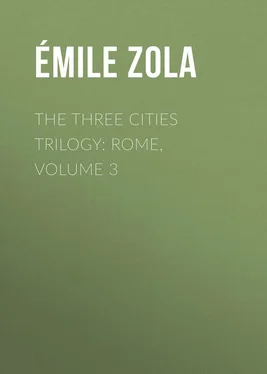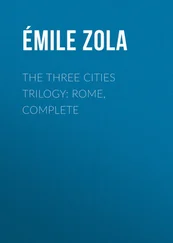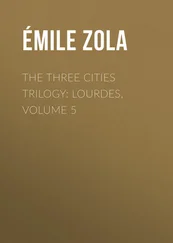Émile Zola - The Three Cities Trilogy - Rome, Volume 3
Здесь есть возможность читать онлайн «Émile Zola - The Three Cities Trilogy - Rome, Volume 3» — ознакомительный отрывок электронной книги совершенно бесплатно, а после прочтения отрывка купить полную версию. В некоторых случаях можно слушать аудио, скачать через торрент в формате fb2 и присутствует краткое содержание. Жанр: literature_19, foreign_antique, foreign_prose, на английском языке. Описание произведения, (предисловие) а так же отзывы посетителей доступны на портале библиотеки ЛибКат.
- Название:The Three Cities Trilogy: Rome, Volume 3
- Автор:
- Жанр:
- Год:неизвестен
- ISBN:нет данных
- Рейтинг книги:3 / 5. Голосов: 1
-
Избранное:Добавить в избранное
- Отзывы:
-
Ваша оценка:
- 60
- 1
- 2
- 3
- 4
- 5
The Three Cities Trilogy: Rome, Volume 3: краткое содержание, описание и аннотация
Предлагаем к чтению аннотацию, описание, краткое содержание или предисловие (зависит от того, что написал сам автор книги «The Three Cities Trilogy: Rome, Volume 3»). Если вы не нашли необходимую информацию о книге — напишите в комментариях, мы постараемся отыскать её.
The Three Cities Trilogy: Rome, Volume 3 — читать онлайн ознакомительный отрывок
Ниже представлен текст книги, разбитый по страницам. Система сохранения места последней прочитанной страницы, позволяет с удобством читать онлайн бесплатно книгу «The Three Cities Trilogy: Rome, Volume 3», без необходимости каждый раз заново искать на чём Вы остановились. Поставьте закладку, и сможете в любой момент перейти на страницу, на которой закончили чтение.
Интервал:
Закладка:
At last, as he was coming out on to the Piazza of St. Peter's, he heard Narcisse asking Monsignor Nani: "Indeed! Do you really think that to-day's gifts exceeded that figure?"
"Yes, more than three millions, 2 2 All the amounts given on this and the following pages are calculated in francs. The reader will bear in mind that a million francs is equivalent to 40,000 pounds. – Trans.
I'm convinced of it," the prelate replied.
For a moment the three men halted under the right-hand colonnade and gazed at the vast, sunlit piazza where the pilgrims were spreading out like little black specks hurrying hither and thither – an ant-hill, as it were, in revolution.
Three millions! The words had rung in Pierre's ears. And, raising his head, he gazed at the Vatican, all golden in the sunlight against the expanse of blue sky, as if he wished to penetrate its walls and follow the steps of Leo XIII returning to his apartments. He pictured him laden with those millions, with his weak, slender arms pressed to his breast, carrying the silver, the gold, the bank notes, and even the jewels which the women had flung him. And almost unconsciously the young priest spoke aloud: "What will he do with those millions? Where is he taking them?"
Narcisse and even Nani could not help being amused by this strangely expressed curiosity. It was the young /attache/ who replied. "Why, his Holiness is taking them to his room; or, at least, is having them carried there before him. Didn't you see two persons of his suite picking up everything and filling their pockets? And now his Holiness has shut himself up quite alone; and if you could see him you would find him counting and recounting his treasure with cheerful care, ranging the rolls of gold in good order, slipping the bank notes into envelopes in equal quantities, and then putting everything away in hiding-places which are only known to himself."
While his companion was speaking Pierre again raised his eyes to the windows of the Pope's apartments, as if to follow the scene. Moreover, Narcisse gave further explanations, asserting that the money was put away in a certain article of furniture, standing against the right-hand wall in the Holy Father's bedroom. Some people, he added, also spoke of a writing table or secretaire with deep drawers; and others declared that the money slumbered in some big padlocked trunks stored away in the depths of the alcove, which was very roomy. Of course, on the left side of the passage leading to the Archives there was a large room occupied by a general cashier and a monumental safe; but the funds kept there were simply those of the Patrimony of St. Peter, the administrative receipts of Rome; whereas the Peter's Pence money, the voluntary donations of Christendom, remained in the hands of Leo XIII: he alone knew the exact amount of that fund, and lived alone with its millions, which he disposed of like an absolute master, rendering account to none. And such was his prudence that he never left his room when the servants cleaned and set it in order. At the utmost he would consent to remain on the threshold of the adjoining apartment in order to escape the dust. And whenever he meant to absent himself for a few hours, to go down into the gardens, for instance, he double-locked the doors and carried the keys away with him, never confiding them to another.
At this point Narcisse paused and, turning to Nani, inquired: "Is not that so, Monsignor? These are things known to all Rome."
The prelate, ever smiling and wagging his head without expressing either approval or disapproval, had begun to study on Pierre's face the effect of these curious stories. "No doubt, no doubt," he responded; "so many things are said! I know nothing myself, but you seem to be certain of it all, Monsieur Habert."
"Oh!" resumed the other, "I don't accuse his Holiness of sordid avarice, such as is rumoured. Some fabulous stories are current, stories of coffers full of gold in which the Holy Father is said to plunge his hands for hours at a time; treasures which he has heaped up in corners for the sole pleasure of counting them over and over again. Nevertheless, one may well admit that his Holiness is somewhat fond of money for its own sake, for the pleasure of handling it and setting it in order when he happens to be alone – and after all that is a very excusable mania in an old man who has no other pastime. But I must add that he is yet fonder of money for the social power which it brings, the decisive help which it will give to the Holy See in the future, if the latter desires to triumph."
These words evoked the lofty figure of a wise and prudent Pope, conscious of modern requirements, inclined to utilise the powers of the century in order to conquer it, and for this reason venturing on business and speculation. As it happened, the treasure bequeathed by Pius IX had nearly been lost in a financial disaster, but ever since that time Leo XIII had sought to repair the breach and make the treasure whole again, in order that he might leave it to his successor intact and even enlarged. Economical he certainly was, but he saved for the needs of the Church, which, as he knew, increased day by day; and money was absolutely necessary if Atheism was to be met and fought in the sphere of the schools, institutions, and associations of all sorts. Without money, indeed, the Church would become a vassal at the mercy of the civil powers, the Kingdom of Italy and other Catholic states; and so, although he liberally helped every enterprise which might contribute to the triumph of the Faith, Leo XIII had a contempt for all expenditure without an object, and treated himself and others with stern closeness. Personally, he had no needs. At the outset of his pontificate he had set his small private patrimony apart from the rich patrimony of St. Peter, refusing to take aught from the latter for the purpose of assisting his relatives. Never had pontiff displayed less nepotism: his three nephews and his two nieces had remained poor – in fact, in great pecuniary embarrassment. Still he listened neither to complaints nor accusations, but remained inflexible, proudly resolved to bequeath the sinews of life, the invincible weapon money, to the popes of future times, and therefore vigorously defending the millions of the Holy See against the desperate covetousness of one and all.
"But, after all, what are the receipts and expenses of the Holy See?" inquired Pierre.
In all haste Nani again made his amiable, evasive gesture. "Oh! I am altogether ignorant in such matters," he replied. "Ask Monsieur Habert, who is so well informed."
"For my part," responded the /attache/, "I simply know what is known to all the embassies here, the matters which are the subject of common report. With respect to the receipts there is, first of all, the treasure left by Pius IX, some twenty millions, invested in various ways and formerly yielding about a million a year in interest. But, as I said before, a disaster happened, and there must then have been a falling off in the income. Still, nowadays it is reported that nearly all deficiencies have been made good. Well, besides the regular income from the invested money, a few hundred thousand francs are derived every year from chancellery dues, patents of nobility, and all sorts of little fees paid to the Congregations. However, as the annual expenses exceed seven millions, it has been necessary to find quite six millions every year; and certainly it is the Peter's Pence Fund that has supplied, not the six millions, perhaps, but three or four of them, and with these the Holy See has speculated in the hope of doubling them and making both ends meet. It would take me too long just now to relate the whole story of these speculations, the first huge gains, then the catastrophe which almost swept everything away, and finally the stubborn perseverance which is gradually supplying all deficiencies. However, if you are anxious on the subject, I will one day tell you all about it."
Читать дальшеИнтервал:
Закладка:
Похожие книги на «The Three Cities Trilogy: Rome, Volume 3»
Представляем Вашему вниманию похожие книги на «The Three Cities Trilogy: Rome, Volume 3» списком для выбора. Мы отобрали схожую по названию и смыслу литературу в надежде предоставить читателям больше вариантов отыскать новые, интересные, ещё непрочитанные произведения.
Обсуждение, отзывы о книге «The Three Cities Trilogy: Rome, Volume 3» и просто собственные мнения читателей. Оставьте ваши комментарии, напишите, что Вы думаете о произведении, его смысле или главных героях. Укажите что конкретно понравилось, а что нет, и почему Вы так считаете.












